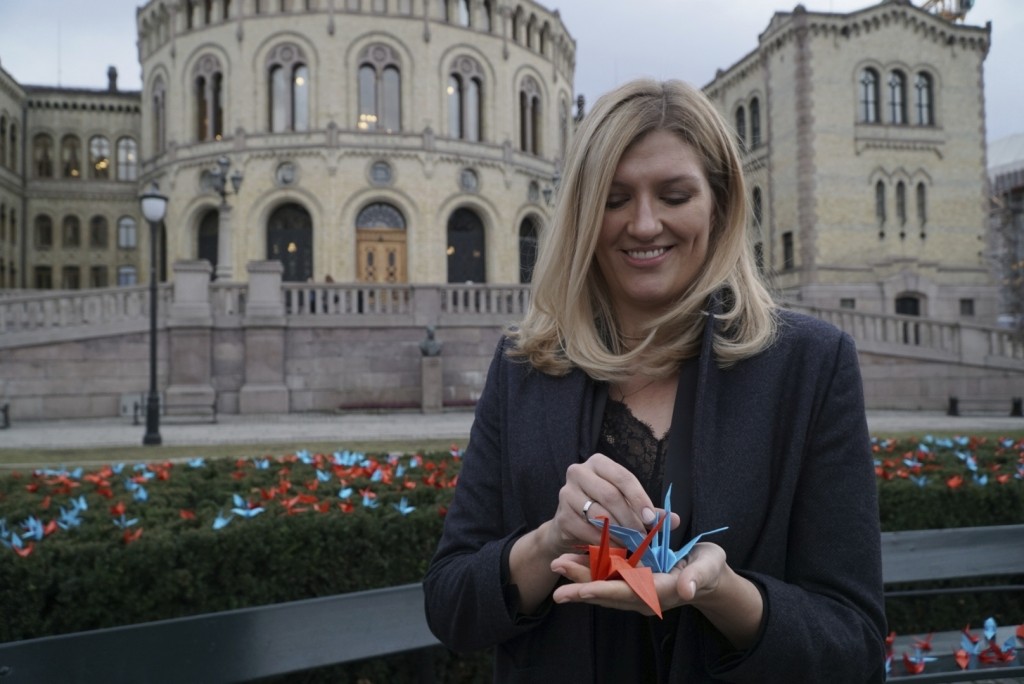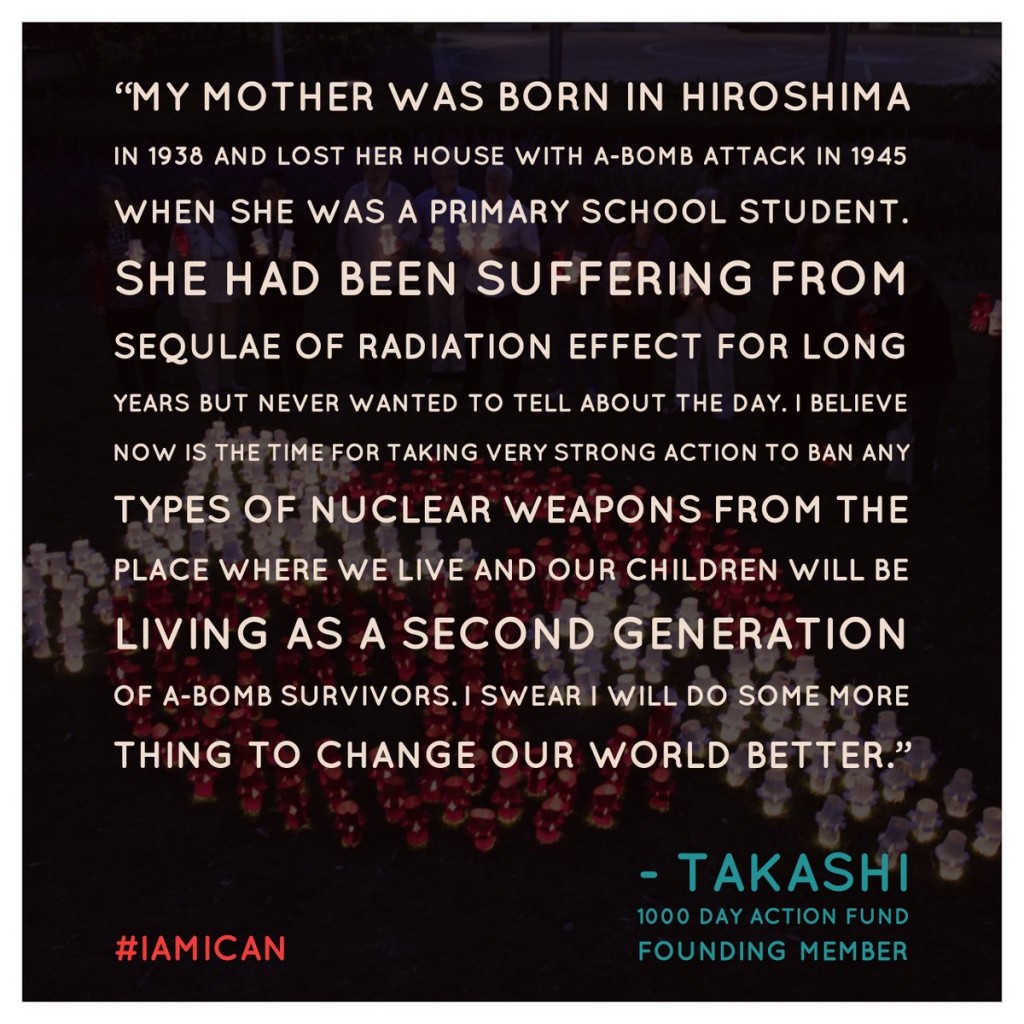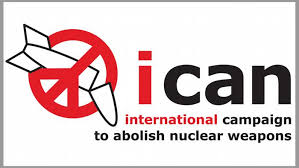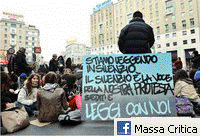International Campaign to Abolish Nuclear Weapons (ICAN)

Beatrice Fihn, the executive director of the International Campaign to Abolish Nuclear Weapons (ICAN) holds two paper cranes in Oslo, Saturday, Dec. 9, 2017. ICAN, the recipient on this year’s Nobel Peace Prize, has installed 1,000 paper cranes made by children in Hiroshima, the site of the world’s first atomic bomb attack in Japan, outside the Norwegian Parliament ahead of formally receiving the prize.(AP Photo/David Keyton).
Award Ceremony Speech
Presentation Speech by Berit Reiss-Andersen, Chair of the Norwegian Nobel Committee, Oslo, 10 December 2017.
Your Majesties, Your Royal Highnesses, Distinguished Representatives of the Nobel Peace Prize Laureate, Your Excellencies, Distinguished Guests, Ladies and Gentlemen, The International Campaign to Abolish Nuclear Weapons (ICAN) has been awarded the Nobel Peace Prize for
2017. On behalf of the Norwegian Nobel Committee, I take great pleasure in congratulating ICAN on this award.
ICAN is receiving the award for its work to draw attention to the catastrophic humanitarian consequences of any use of nuclear weapons and for its ground-breaking efforts to achieve a treaty-based prohibition of such weapons. ICAN’s efforts have given new momentum to the process of abolishing nuclear weapons.
This year’s Peace Prize follows in a tradition of awards that have honoured efforts against the proliferation of nuclear weapons and for nuclear disarmament. Twelve Peace Prizes have been awarded, in whole or in part, for this type of peace work. The first went to Philip Noel-Baker in 1959, and the most recent was awarded to Barack Obama in 2009. And now, this year, to the International Campaign to Abolish Nuclear Weapons (ICAN).
On two days in August 1945, the world experienced the terrible destructive force of nuclear weapons for the first time. The bombings of Hiroshima and Nagasaki instantly killed at least 140,000 people, the vast majority of whom were civilians. Hiroshima was utterly destroyed and large sections of Nagasaki were laid in ruins. But The Nobel Peace Prize 2017 – Presentation Speech 12/12/2017 12’18 death was not finished with Hiroshima and Nagasaki in August 1945. The death toll continued to rise significantly in the years that followed, and survivors are still suffering from the effects of radiation today.
The devastation of Hiroshima and Nagasaki has taught us that nuclear weapons are so dangerous, and inflict so much agony and death on civilian populations, that they must never, ever, be used again.
Today’s nuclear weapons are tremendously more destructive than the bombs that were dropped on Japan in 1945. A nuclear war could kill millions of people, dramatically alter the climate and the environment for much of the planet, and destabilise societies in a way never before seen by humanity. The notion of a limited nuclear war is an illusion.
Nuclear weapons do not distinguish between military and civilian targets. Used in war, they would impact disproportionately on the civilian population, inflicting vast, unnecessary suffering. It is virtually impossible for civilians to protect themselves against the catastrophic effects of a nuclear attack. The use of nuclear weapons – or even the threat of using them – is therefore unacceptable on any grounds, whether humanitarian, moral or legal.
Despite all this, it remains the case that the global balance of military power is maintained by nuclear weapons. The logic of this balance of terror rests on the proposition that nuclear weapons are such a deterrent that no one would dare attack a nuclear-armed state. The deterrent effect is said to be so strong that it alone has prevented war between the nuclear powers for the last 70 years. The empirical basis for this assumption is highly debatable. It cannot be claimed with any certainty that deterrence has worked as intended. It is also worth keeping in mind that nuclear deterrence requires a credible threat to actually use nuclear weapons. The weapons exist so that they can, if necessary, be deployed.
A number of international agreements and treaties have been entered into which limit the possession and development of nuclear weapons. The most important of these is the Treaty on the Non-Proliferation of Nuclear Weapons, or NPT. It takes considerable military and political insight to fully understand all the treaties, agreements and international legal instruments that regulate disarmament and arms control. The views that
dominate the political debate are those of the great powers and powerful alliances.
ICAN arose as a protest against the established order. Nuclear weapon issues are not solely a question to beaddressed by governments, nor a matter for experts or high-level politicians. Nuclear weapons concern everyone, and everyone is entitled to an opinion. ICAN has succeeded in generating fresh engagement among ordinary people in the campaign against nuclear weapons. The organisation’s acronym is perhaps not a
coincidence: I CAN.

ICAN’s main message is that the world can never be safe as long as we have nuclear weapons. This message resonates with millions of people who perceive that the threat of nuclear war is greater than it has been for a long time, not least due to the situation in North Korea.
Another major concern of ICAN is that the current international legal order is inadequate to deal with the nuclear weapons problem.
The entry into force of the Non-Proliferation Treaty in 1970 was a historic breakthrough. It gave formal status to the nuclear powers of the day – the United States, the Soviet Union, the UK, France and China – as states with the legal right to possess nuclear weapons. All other countries that acceded to the treaty pledged, in so doing, not to acquire such weapons. In return, the legally recognized nuclear-weapon states undertook to
begin negotiations in good faith to seek nuclear disarmament. This dual pledge is the very core of the Non-Proliferation Treaty, and both sides of it must be honoured to maintain the treaty’s legitimacy.
Ladies and gentlemen, it is no exaggeration to say that the nuclear-weapon states have only to a limited degree honoured the disarmament commitment they made in the NPT. Let me remind you that in 2000 the NPT’s Review Conference stated that the treaty calls for “an unequivocal undertaking by the nuclear-weapon states to accomplish the total elimination of their arsenals leading to nuclear disarmament”. From an international law perspective, the five legally recognized nuclear-weapon states and their allies have thus assumed a responsibility to help achieve disarmament and a world free of nuclear weapons. If the disarmament process had been carried out as intended, ICAN’s struggle for a treaty-based ban on nuclear weapons would have been unneeded. It is the lack of progress towards nuclear disarmament that has made it necessary to supplement the Non-Proliferation Treaty with other international legal initiatives and commitments.
The Non-Proliferation Treaty applies only to the countries that have acceded to it. India, Pakistan and Israel, which all have nuclear weapons, are not NPT members. Moreover, North Korea, which has carried out six nuclear test explosions, has withdrawn from the treaty. Global nuclear disarmament cannot take place without these countries, too, participating. Yet they reserve for themselves the same right to nuclear weapons
as the five states that had acquired such weapons prior to 1970. The five legally recognized nuclear-weapon states, for their part, cite the nuclear arsenals of these other countries as one of several arguments for not yet being able to comply with the NPT’s nuclear disarmament requirements.
It is in part to break this vicious cycle that ICAN has advocated a universal, treaty-based ban on nuclear weapons.
ICAN does not accept that the lack of progress towards nuclear disarmament is a realpolitik necessity. ICAN’s premise is humanitarian, maintaining that any use of nuclear weapons will cause unacceptable human suffering. Binding international prohibitions have already been established for chemical weapons, biological weapons, land mines and cluster weapons, precisely because of the unacceptable harm and suffering that these weapons inflict on civilian populations. It defies common sense that nuclear weapons, which are far more dangerous, are not subject to a comparable ban under international law.
Pointing out this legal gap was a crucial first step on the road to a prohibition treaty. Another important step was the Humanitarian Pledge initiated by the Austrian Government in December 2014. The Pledge is a voluntary national commitment to seek to stigmatise, prohibit and eliminate nuclear weapons. ICAN has worked resolutely to muster broad international support for the Humanitarian Pledge. To date, 127 states
have signed on to this commitment.
ICAN has also been a driving force in efforts to secure a binding international ban of nuclear weapons. On 7 July 2017, a final draft treaty was endorsed by 129 UN member states. The Treaty on the Prohibition of Nuclear Weapons was opened for signature this autumn, and has been signed so far by 56 states. When 50 or more states have also ratified the treaty, it will become binding under international law for the signatory states.
ICAN is a young organisation, founded in 2007 on the initiative of the International Physicians for the Prevention of Nuclear War, which won the Nobel Peace Prize in 1985. ICAN is a loose coalition of 468 NGOs from more than 100 countries. It is impressive that ICAN is able to unite so many different groups in support of a common goal and give a voice to millions of people who are convinced that nuclear weapons do not provide security, but insecurity.
In awarding this year’s Peace Prize to ICAN, the Norwegian Nobel Committee seeks to honour this remarkable endeavour to serve the interests of mankind.
The Nobel Committee believes that an international ban on nuclear weapons will be an important, possibly decisive, step on the road to a world without nuclear weapons. Such a goal is fully consistent with the essence of Alfred Nobel’s will.
Ladies and gentlemen, ICAN’s support for a global ban on nuclear weapons is not uncontroversial. We must acknowledge that the treaty has powerful opponents, but the idea of prohibiting and abolishing nuclear weapons is neither naïve nor new. As early as 1946, in the UN General Assembly’s very first resolution, the United Nations called for nuclear disarmament and an international nuclear weapons control regime.
At the Reykjavik Summit in 1986, Mikhail Gorbachev and Ronald Reagan tried to halt the spiralling nuclear arms race between the two superpowers, and came close to concluding an agreement to abolish all longrange nuclear missiles. A year and a half earlier, President Reagan had addressed the people of the United States and the Soviet Union directly, saying:
“A nuclear war cannot be won and must never be fought. The only value in our two nations possessing nuclear weapons is to make sure they never will be used. But then, would it not be better to do away with them entirely?”
Today it is more important than ever to support this vision. While the global community may trust that no responsible head of state would ever order another nuclear attack, we have no guarantees that it will not happen. Despite international legal commitments, irresponsible leaders can come to power in any nucleararmed state and become embroiled in serious military conflicts that veer out of control.
Ultimately, nuclear weapons are controlled by human beings. In spite of advanced security mechanisms and control systems, technical and human errors can occur, with potentially catastrophic consequences. Can we be sure that the control systems of the nuclear powers will not someday be sabotaged by hackers acting on behalf of hostile states, terrorists or extremists?
In short, nuclear weapons are so dangerous that the only responsible course of action is to work for their removal and destruction.
Many people think that the vision of a nuclear weapon-free world, a Global Zero, is utopic, or even irresponsible.
Similar arguments were once used to oppose the treaties banning biological and chemical weapons, cluster weapons and land mines. Nonetheless, the prohibitions became reality and most of these weapons are far less prevalent today as a result. Using them is taboo.
Ladies and gentlemen, the Norwegian Nobel Committee is aware that nuclear weapons disarmament presents far greater challenges than disarmament of the types of weapons I just mentioned. But there is no getting around the fact that the nuclear weapon states have committed, through the Non-Proliferation Treaty, to work towards disarmament. This is the ultimate objective of the treaty. Through its efforts, ICAN has reminded the nuclear weapon states that their commitment entails a genuine obligation, and the time to honour it is now!
In his Nobel lecture in 1959, Philip Noel-Baker took issue with the widely held opinion that complete nuclear disarmament is impossible to achieve in the real world. He quoted another Peace Prize laureate, Fridtjof Nansen:
“The difficult is what takes a little while; the impossible is what takes a little longer.”
The people of ICAN are impatient and visionary, but they are not naïve. ICAN recognizes that the nucleararmed states cannot eliminate their nuclear weapons overnight. This must be achieved through a mutual, gradual and verifiable disarmament process. But it is the hope of ICAN and the Norwegian Nobel Committee that an international legal ban, and broad popular engagement, will put pressure on all nuclear-armed states
and expedite the process.
Ladies and gentlemen, there are two persons on the podium today who, each in their way, are outstanding representatives of the ICAN movement.
Madam Setsuko Thurlow, you were 13 years old when you experienced the bombing of Hiroshima. You have devoted your life to bearing witness to the events of 6 August 1945. You see it as your mission to describe the suffering, fear and death inflicted on your city. No one was spared. Little children, their parents, brothers and sisters, schoolmates and grandparents were killed. You say that war cannot be waged in this way, and that it
must never happen again. You do not allow us to forget.
Beatrice Fihn, you are the Executive Director of ICAN and have the challenging task of uniting different organisations and interest groups in pursuit of a common goal. You are a splendid representative of the multitude of idealists who forgo an ordinary career and instead devote all of their time and skills to the work of achieving a peaceful world.
It is an honour to have you here as our guests, and we wish to express our deep and heartfelt gratitude for the work that you do. Our tribute also goes to all the individuals and organisations that you represent.
The decision to award the Nobel Peace Prize for 2017 to the International Campaign to Abolish Nuclear Weapons has a solid grounding in Alfred Nobel’s will. The will specifies three different criteria for awarding the Peace Prize: the promotion of fraternity between nations, the advancement of disarmament and arms control and the holding and promotion of peace congresses. ICAN works vigorously to achieve nuclear disarmament.
ICAN and a majority of UN member states have contributed to fraternity between nations by supporting the Humanitarian Pledge. And through its inspiring and innovative support for the UN negotiations on a Nuclear Weapon Ban Treaty, ICAN has played an important role in bringing about what in our day and age is equivalent to an international peace congress.
In closing, I would like to quote His Holiness Pope Francis, who recently declared: “Weapons of mass destruction, particularly nuclear weapons, create nothing but a false sense of security. They cannot constitute the basis for peaceful coexistence between members of the human family, which must rather be inspired by an ethics of solidarity.”
The Norwegian Nobel Committee shares this view. Moreover, it is our firm conviction that ICAN, more than anyone else, has in the past year given the efforts to achieve a world without nuclear weapons a new direction and new vigour.
Thank you.












